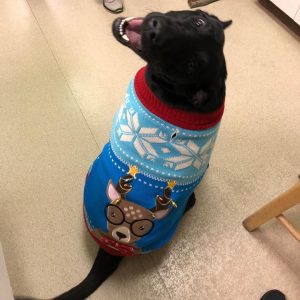With Thanksgiving and the holiday season right around the corner, it can be a time of excitement and celebration for you and your family. There is always a lot to be thankful for, especially when it comes to our animals. Did you know that the holiday season is one of the most popular for traveling? If you are traveling this winter, with or without your pet, it can be important to plan ahead and ensure everything is in order prior to the big holiday vacation. Here are 5 tips from Weddington Animal Hospital to keep you and your pet safe and prepared during travel this holiday season.
1) Plan ahead
If you know you will be traveling over the holidays and are planning on boarding your pet, we recommend booking boarding in advance. If your pet will be staying at a kennel, we recommend ensuring they are up to date on all vaccinations, especially the bordetella vaccine that protects against kennel cough. If your pet gets nervous while at the boarding facility or needs any medications refilled prior to boarding, we recommend contacting your veterinarian to discuss the best plan for your pet. If you are flying with your pet on an airline, we recommend contacting the airline in advance to ensure all documentation and paperwork is correct. Different airlines have different requirements for pets for travel. A health certificate is also required when traveling by airplane (see #4 below).
2) Be identifiable
If you are traveling with your pet over the holidays, it is important to make sure they are healthy and up to date on their vaccinations prior to travel. A safe, properly fitting collar with your contact information as well as a microchip is highly recommended for your pet to help identify and locate them in case they are ever lost. If your pet is traveling inside your vehicle, consider options such as a seatbelt or a crate to help protect them and prevent slipping, sliding or falling. If you are traveling with your cat or pocket pet, be sure to keep them inside a carrier during transport to prevent distracted driving or injury. Ensure your pet’s identifiable information is listed on the carrier to help in case of emergency.
3) Manage Belongings
If your pet is on any medications, ensure you have enough refills to get through your trip. If your pet gets nauseous or nervous in the car, contact your veterinarian to discuss options for anti nausea or anti anxiety medication. If your pet is diabetic, be sure to pack a cooler to keep their insulin temperature regulated during travel. Be sure to bring enough dog or cat food to help last you through your trip. If your pet is on a prescription food, be sure you have enough to last through your trip. If you are boarding your pet, be sure to label your pets belongings to ensure they don’t get misplaced.
4) Health Certificates
If you are crossing state or international lines or flying with your pet, a health certificate is required to accompany your pet. This is a government document ensuring that your pet is healthy and meets state requirements for travel. A health certificate can be performed by a USDA accredited veterinarian and is able to be used for 30 days after distributed. Be sure to also bring along a copy of your pet’s vaccine records, particularly rabies certificate.
Each state or country has individual guidelines regarding health certificates. If you are planning an international trip for your pet, please contact your veterinarian as far in advance as possible of your trip to ensure everything is organized prior to travel. If your pet gets anxious or nauseous in the car, we recommend contacting your veterinarian prior to travel to discuss a plan for them.
5) Stay protected
New locations with other pets, hotels, and boarding facilities can expose your pet to unwanted holiday guests – specifically, fleas, ticks, and heartworm-carrying mosquitoes. Ensure your pet is current on their flea and tick and heartworm medication to prevent bringing any bugs or other stowaways home. If you have any questions about heartworms, fleas or ticks or need a refill on your prevention, please contact your veterinarian.
Traveling can be stressful, but a little planning can help ensure a safe and fun trip, both for you and your pet. By following these tips, we hope you and your pet will be prepared and have a great trip. If you have any questions about traveling or anything discussed above, please do not hesitate to contact us at wah@wahcares.com or 704-847-8466. From all of us at Weddington Animal Hospital, we wish you a happy holiday season.


